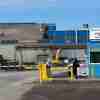
Mad scramble for rapid antigen tests in Manitoba raises new questions about pandemic response
CBC
A shortage of COVID-19 testing capacity has some Manitobans scrambling to find rapid antigen tests — and experts wondering why the province waited so long to make the home-use devices more widely available.
The province has been unable to meet the demand for COVID-19 tests since Dec. 23, when long lines to obtain nasopharyngeal swabs were compounded by a laboratory processing backlog.
To ease the burden on private and public laboratories that conduct PCR tests, public health is now sending rapid antigen tests home with symptomatic and vaccinated people who show up at testing sites.
The province is also distributing rapid tests to businesses, through social service offices, and directly to some people with disabilities.
But, other Manitobans are left seeking out rapid antigen tests with a fervour.
At the Food Fare grocery store in the Winnipeg neighbourhood of Crescentwood, packages of 25 rapid antigen tests were on sale for $400, while individual tests, unwrapped and repackaged with photocopied instructions, sold for $40 each before supplies ran out, company president Munther Zeid said.
He said his markup was minimal, given the labour involved in repackaging and sanitizing the kits.
WATCH | Here's how to take a rapid COVID-19 test:
"People don't want to wait five or six hours in line for a test," said Zeid, adding some pharmacies are selling individual kits for $50. "We sold out in three days because we had the lowest price."
Some online retailers were selling rapid antigen tests for as little as $50 for packs of five.
Some business owners, meanwhile, have distributed some of the allotment they received to acquaintances who work with the public.
Jordan Farber, whose real-estate business received 60 rapid antigen tests through a Winnipeg Chamber of Commerce program, said he provided kits to teachers and health-care workers.
"When I realized that health-care workers, teachers and parents whose kids are in daycare with our daughter didn't have access to rapid tests, I made the decision," he said. "Be it right or wrong, permitted or not, a lot of these people are in a bind."
Farber said he is frustrated to see other provinces — such as Ontario — distribute rapid tests in retail stores and libraries.













